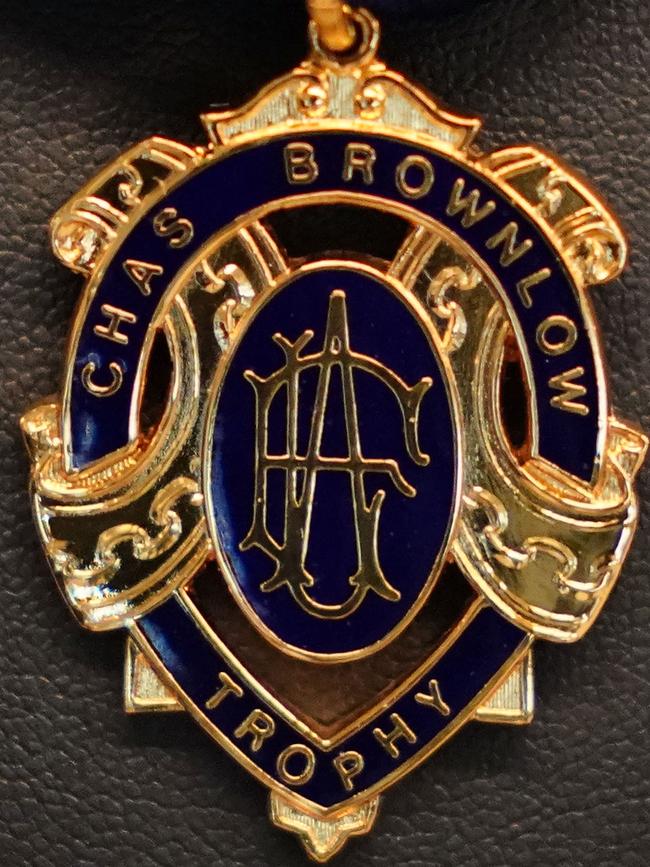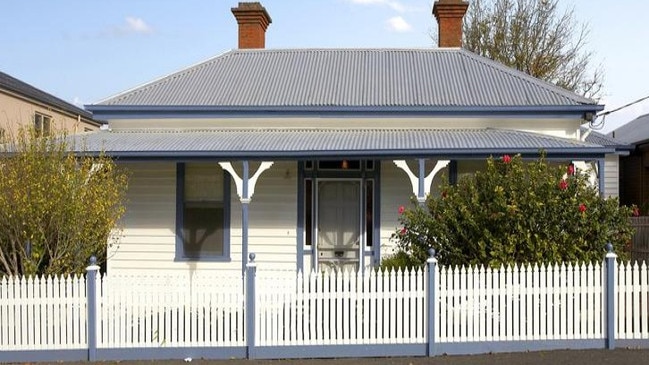Charles Brownlow: the story of the man behind the medal
Charles Brownlow is known throughout Victoria thanks to the medal that bears his name. But his on and off-field exploits rival that of any in line for the league’s best and fairest.

Black and White
Don't miss out on the headlines from Black and White. Followed categories will be added to My News.
IT’S the biggest individual accolade in footy, named after a man known as Charles Brownlow, Chas Brownlow, or simply “Charlie”.
But it was a different name he used when he first played in Geelong to keep his life as a footballer a strict secret.
He was not Charles Brownlow at all — but rather Charles Green.
The reason for the alias — and the intriguing tale of how his true identity was exposed — is the subject of the latest In Black and White podcast, out today in time for Brownlow night.
Col Hutchinson, historian for both the AFL and the Geelong Football Club, says Brownlow adopted an alias after his dad refused permission for him to play footy when he was 16 or 17, fearing he would be hurt because of his young age.


“Charles took it upon himself to use the assumed name; just registered himself as Charles Green with the then North Geelong Football Club,” he says.
“It was quite close to the centre of Geelong, ironically at the headquarters where East Geelong now plays, which was in easy walking distance of where the Brownlow family lived.”
Hutchinson says young “Green” proved to be a promising recruit, featuring prominently in football match reports in the newspapers.
“You can imagine his dad skimming through the newspaper … and noticed that Green seemed to frequently appear on the best player list for North Geelong and must have been quite an outstanding performer.
“Little did he know it was his own son!”
A fascinating account of how the secret was uncovered comes from a 1924 newspaper article found by journalist Chris Adams, who tells the story in Grave Tales: Great Ocean Road Country — Geelong to Port Fairy, co-written with Helen Goltz.
Published in Perth’s Sunday Times in 1924, soon after Brownlow’s death, the article is headlined “The Late Charles Brownlow, An Appreciation, By An Old Chum”.
The old schoolmate, who said he knew Brownlow for 50 years, recalled a great match was set for a certain Saturday, and excitement in “Sleepy Hollow” ran high.

Even Brownlow Sr, “a disciplinarian of the old school” who rarely attended the footy was “smitten by that excitement”, and came to see the local team “do battle with a crack team
from Melbourne”.
“Arriving a bit late, he had to content himself with a back seat in the stand, but as the game proceeded the brilliant play of young Green more than attracted his attention, and in his enthusiasm he barracked for all he was worth for Green,” the schoomate wrote.


“His excitement greatly amused a friend of his who knew of the alias, and when Brownlow pater went frantically wild over a bit of extra brilliant play on the part of Green, he slapped him on the back and facetiously asked Brownlow if he knew for whom he was barracking so splendidly.”
“Green, of course,” answered the excited father.
“No fear!” replied his friend.
“Don’t you know you are cheering your own son?
“Surely, after this you can’t forbid him to play senior football!”
Brownlow Sr was flabbergasted, but the incident led to a change of heart and he became a firm supporter of his son’s footy career.
Outside football, Brownlow completed a silversmith apprenticeship and worked in Geelong as a jeweller and watchmaker.
Brownlow played with the Geelong Football Club for a few years, then spent nearly 40 years with the club as an administrator, when he was renowned as an innovator.

Hutchinson says Brownlow helped pioneer the introduction of boundary umpires, an official timekeeping system, numbering of players’ jumpers, and the formation of the tribunal.
LISTEN TO THE PODCAST TO FIND OUT MORE.
Subscribe to the podcast on iTunes here, on Spotify here or on your favourite platform.
Read more on the earlier episodes, from the slum boss’s friendship with Richmond great Jack Dyer, the champion Collingwood captain who was also a hero cop, and footy founder Tom Wills, and how Aussie rules really got started in Australia.
Check out In Black & White in the Herald Sun newspaper Monday to Friday to see more stories like this.


